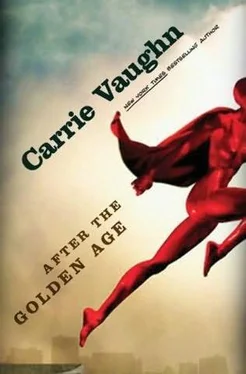Her voice fell again. “Yes.”
“No further questions, your honor.”
Now that it was over, it didn’t seem so bad. She breathed a sigh of relief. It could have been worse.
“Does the prosecution wish to cross-examine?”
“Yes, your honor. Ms. West? You underwent psychiatric evaluation immediately following the two months that Mr. Malone referred to, is this correct?”
“Yes.”
“And what was the conclusion of the evaluation?”
She took a deep breath. She hoped those reporters were still paying attention. She and Bronson had crafted this answer. “That I had acted irrationally, that I suffered from a variety of traumatic stress disorders related to both the uncertainty of my parents’ lifestyle and the kidnapping by the defendant that I suffered the year before.”
“In fact, the conclusion was that you suffered temporary insanity and could not be held accountable for your actions.”
“Yes.”
“Could you tell me briefly what you’ve been doing in the eight years since then?”
“I went to college. I earned an MBA, passed the CPA exam on the first try, was hired on at Smith and Kurchanski, and I’ve been working there for two and a half years. I have an apartment in the west downtown area. I live quietly.”
“Would you say that in that time, your actions have been influenced either by hatred of or identification with Mr. Sito or his organization?”
She hesitated. In an indirect sense, Sito had influenced her entire life. Her parents wouldn’t have become who they were without Sito, and she wouldn’t have become who she was without that.
But Mentis was right. The last eight years were her own. “No.”
“Thank you, no further questions.”
The judge turned to the defense. “Mr. Malone?”
“No further questions.”
“Ms. West, you are dismissed.”
“Thank you,” she whispered.
She kept her chin up, her eyes up as she walked back to her seat. Bronson flashed her a smile. She felt exhausted.
“You look like you’ve run a marathon,” Mentis said as she sat beside him.
“I need a drink,” she said.
After another hour, the judge finally called a recess for lunch. Reporters mobbed Celia. She only heard a fraction of their questions.
“—how did your parents react when—feelings toward the Destructor—why a secret for so long—affect your job—affect the trial—”
She was afraid to say anything that would undermine what she’d already said under oath. Teenage rebellion wasn’t normally considered a form of temporary insanity.
Arthur stepped in for her. “I’ve known Celia for ten years, and I can assure you I have the utmost confidence in her.”
They escaped to Bronson’s conference room.
“They’re going to bring up that first day of the hearing, when he talked to me and no one could figure out why,” she said. “They’re going to think there’s still a connection.”
Helpfully, Bronson burst in then. “It’s all irrelevant, I think we convinced the jury of that. You did great, Celia, just great. Hey, Rudy—” He went off to harass an assistant.
Mentis handed her a cup. Coffee, not bourbon, alas. She said, “I’m never going to get away from all this, am I? Even if my record never came out, it would always be something else. Why aren’t I a better citizen, why don’t I do more, why aren’t I more like them?” He didn’t respond; merely waited, calmly, for her to spill her thoughts. It was easy to do; he already knew what she was going to say, didn’t he? “People tell me how great it must have been, growing up with Captain Olympus and Spark for parents.” She shook her head.
“Overrated, you think?”
“Everyone is so amazed by them, so awestruck. To be able to move so fast you can fly, to create fire from your bare hands, to knock down walls, to have the power of gods … but I grew up with it. It wasn’t special to me, it was just normal. It was Mom and Dad. I don’t see what everyone else sees. I wish I could, sometimes.” She looked at the ceiling, then scrubbed at her eyes to keep tears from starting. Stress. It was just stress.
“I’ll tell you something,” Arthur said. “Until a certain age, everyone thinks their parents are heroes. Then they grow up a little, start to understand a little more of the world, and they realize their parents are just people. It destroys them, just a little bit. But it’s part of becoming an adult. Everyone goes through it. You, on the other hand—your parents really are heroes, at least to everyone else. It’s a bit remarkable, really. You never went through that disappointment of finding out your parents are just people.”
Except they were just people—she saw the side of them that no one else did, the bickering over supper and cooking pasta at the stove. She was the only one who understood that they were just people—that was where her frustration lay.
Arthur smiled his impenetrable smile.
Celia answered it with a wry grin of her own. “Are you psychoanalyzing me again?”
“Would I do such a thing?” He turned on his heel and left the room.
Mom arrived to check on her. Dad wasn’t there. He’d already left. Celia didn’t ask why. Mom would say “work,” and then Celia would have to ask what kind of work—West Corp work or the other work—and she didn’t really want to know. Suzanne offered her a ride home and Celia accepted because her mother had driven herself—her own car, not the limo, which was awfully conspicuous. She didn’t want anyone noticing her right now.
Mark was waiting in the corridor that led to the courthouse’s back door. He was leaning on the wall, arms crossed, shoulders hunched sullenly.
Something’s happened, Celia thought.
Straightening, he moved to the middle of the corridor, blocking their path, and stared at her.
“Hi, Mark.”
He didn’t say anything. Just glared hard at her, like he could peel back skin and see what was underneath, or become a telepath through sheer willpower. Yeah, something had happened, all right. And it was all centered on her.
“What’s wrong?” she said, unable to keep a neutral tone. Her muscles had clenched defensively.
“Why didn’t you tell me?” His voice was tight, like he was holding back anger, keeping his temper in check. Like she was.
Suzanne remained a step behind Celia, watching.
“Tell you what?” she said, with willful ignorance.
“What you said in there. About you and the Destructor.” Like he could barely say the words.
She stared at him. “What exactly was I supposed to say?”
“You should have told me.”
“Why? I don’t tell anyone. Before now I could count on my hands the number of people who knew about it. It was a long time ago.” Mark was just standing there, seething. She couldn’t tell what he was thinking. “You’re angry,” Celia said, trying to prompt a response.
“Of course I am! This is like finding out you’re … you’re—” Evidently, he couldn’t think what it was like. “I mean, you’re with the Destructor—”
“Was,” Celia pointed out. “ Was with him. Briefly.”
“That isn’t some petty shoplifting rap on a juvenile record. I—” He glanced at Suzanne and closed his mouth. “I’ll call you later.”
He shouldered past them, keeping space between himself and Celia as he did.
“Mark!” She called after him, mostly as a matter of form, even though she knew he wasn’t going to turn around. He had principles and he liked to stand by them.
She sighed tiredly.
Her mother put a hand on her shoulder. “He’ll come around,” she said. “He’s had a shock, that’s all. He’ll understand after he’s cooled off.”
“Are you sure you want him to come to dinner?”
Читать дальше












